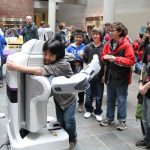 Covid has undoubtedly prompted a significant change in our opinions and behaviors towards other people, but new research from USC reveals that it’s also triggered a shift in how we think about machines.
Covid has undoubtedly prompted a significant change in our opinions and behaviors towards other people, but new research from USC reveals that it’s also triggered a shift in how we think about machines.
“The new discovery here is that when people are distracted by something distressing, they treat machines socially like they would treat other people,” the researchers say. “We found greater faith in technology due to the pandemic and a closing of the gap between humans and machines.”
The researchers believe that our behavior towards others is generally driven by heuristics that are underpinned by social norms. When we deal with machines, however, we tend to dispense with these norms.
Growing compassion
Interestingly, however, the researchers note that when people had previously suffered from Covid, it appeared that they were more altruistic in their behavior towards both other people and towards machines.
They came to this conclusion after inviting volunteers to play a “dictator game”, which is commonly used to measure altruistic behaviors. Some of the volunteers were specifically chosen because they’d been adversely affected by Covid, with the game requiring them to compete against both other humans and machines.
Whereas previously people would usually display more compassion towards humans than machines, in this experiment, the levels of altruism were equal. Indeed, as the impact of Covid grew, so too did the compassion shown towards technology.
“Our findings show that as people interacted more via machines during the past year, perceptions about the value of technology increased, which led to more favorable responses to machines,” the researchers say.
The authors suggest that perhaps the significant technological breakthroughs with things like the Covid vaccines has restored the public’s faith in technology and prompted a shift in how we behave towards it.
The findings are also consistent with previous work that shows how disasters change our level of compassion as people feel compelled to help those less fortunate than themselves. The pandemic has also raised our dependence on technology, with work, education, healthcare, shopping, and socializing increasingly done with the help of technology.